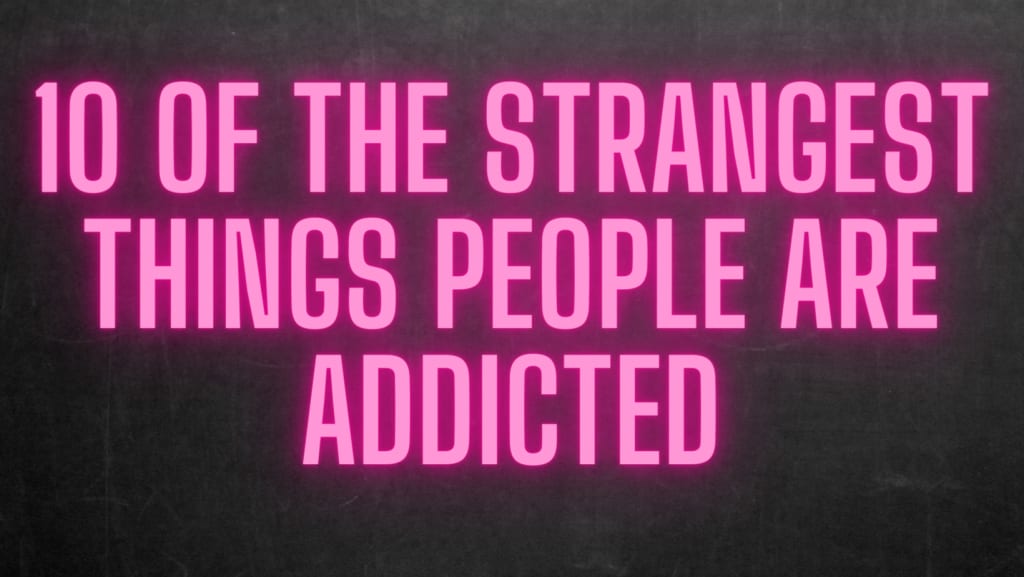10 of the Strangest Things People Are Addicted
It's important to note that these behaviors may be a sign of an underlying mental health issue or disorder and should be addressed by a medical or mental health professional.

Eating dirt or other non-food items (pica)
Pulling out one's own hair (trichotillomania)
Eating raw meat (carnivorous mica)
Drinking blood (sanguinarianism)
Drinking urine (urophagia)
Licking objects or surfaces (lithophagia)
Chewing on ice (pagophagia)
Swallowing objects (acuphagia)
Eating feces (coprophagia)
Compulsive gambling (pathological gambling)
Eating dirt or other non-food items (pica)
Pica is a disorder characterized by the persistent eating of non-food items. This behavior is typically seen in children, but it can also occur in adults. Common items that are eaten in cases of pica include dirt, clay, paper, soap, chalk, and ice. Pica can be a sign of an underlying medical condition, such as iron deficiency anemia, or it can be a symptom of a mental health disorder, such as obsessive-compulsive disorder (OCD) or a developmental disorder. It is important to seek medical attention if you or someone you know is exhibiting pica behavior, as it can be dangerous and potentially lead to serious health complications.
Pulling out one's own hair (trichotillomania)
Trichotillomania, also known as hair-pulling disorder, is a mental health disorder characterized by the recurrent pulling out of one's own hair, resulting in noticeable hair loss. It is classified as an impulse control disorder, and it is thought to be related to problems with impulse control and emotional regulation. Trichotillomania can cause significant distress and impairment in functioning, and it often occurs alongside other mental health conditions, such as anxiety and depression. Treatment for trichotillomania typically includes a combination of therapy, medication, and self-help strategies. Cognitive-behavioral therapy (CBT) is often used to help individuals learn coping skills to manage the urge to pull their hair and to reduce the negative impact of the behavior on their lives. Medications such as selective serotonin reuptake inhibitors (SSRIs) may also be helpful in reducing the frequency and severity of hair-pulling episodes.
Eating raw meat (carnivorous mica)
Eating raw meat, also known as carnivorous mica, is not considered to be a mental health disorder. However, it is not a safe or healthy practice, as raw meat can contain harmful bacteria and parasites that can cause food poisoning or other serious illnesses. Cooking meat to appropriate temperatures kills these potentially harmful microorganisms and makes it safe to eat. Additionally, a diet that consists primarily of raw meat may not provide all of the necessary nutrients that the body needs to function properly. It is important to follow food safety guidelines and to consume a balanced and varied diet to ensure optimal health.
Drinking blood (sanguinarianism)
Drinking blood, also known as sanguinarianism, is not a common or socially accepted behavior, and it is not considered to be a mental health disorder. However, it may be a symptom of an underlying mental health condition, such as an obsession or addiction, or it may be a part of a person's personal beliefs or practices. It is important to note that drinking blood is not a safe or healthy behavior and can potentially lead to serious health complications, such as infection or disease transmission. If you or someone you know is exhibiting this behavior, it is important to seek medical and mental health treatment to address any underlying issues and to ensure the individual's safety and well-being.
Drinking blood (sanguinarianism)
Drinking blood, also known as sanguinarianism, is not a common or socially accepted behavior, and it is not considered to be a mental health disorder. However, it may be a symptom of an underlying mental health condition, such as an obsession or addiction, or it may be a part of a person's personal beliefs or practices. It is important to note that drinking blood is not a safe or healthy behavior and can potentially lead to serious health complications, such as infection or disease transmission. If you or someone you know is exhibiting this behavior, it is important to seek medical and mental health treatment to address any underlying issues and to ensure the individual's safety and well-being.
Drinking urine (urophagia)
Drinking urine, also known as urophagia, is not a common or socially accepted behavior, and it is not considered to be a mental health disorder. However, it may be a symptom of an underlying mental health condition, such as an obsession or addiction, or it may be a part of a person's personal beliefs or practices. It is important to note that drinking urine is not a safe or healthy behavior and can potentially lead to serious health complications. Urine contains waste products that have been filtered from the blood by the kidneys, and consuming it can lead to dehydration and electrolyte imbalances. Additionally, urine can contain harmful bacteria and other potentially toxic substances. If you or someone you know is exhibiting this behavior, it is important to seek medical and mental health treatment to address any underlying issues and to ensure the individual's safety and well-being.
Licking objects or surfaces (lithophagia)
Licking objects or surfaces, also known as lithophagia, is not a common or socially accepted behavior, and it is not considered to be a mental health disorder. However, it may be a symptom of an underlying mental health condition, such as an obsession or addiction, or it may be a part of a person's personal beliefs or practices. It is important to note that licking objects or surfaces is not a safe or healthy behavior and can potentially lead to serious health complications, such as infection or disease transmission. If you or someone you know is exhibiting this behavior, it is important to seek medical and mental health treatment to address any underlying issues and to ensure the individual's safety and well-being.
Chewing on ice (pagophagia)
Chewing on ice, also known as pagophagia, is a behavior that is characterized by the compulsive consumption of ice or ice chips. It is not considered to be a mental health disorder on its own, but it may be a symptom of an underlying medical or mental health condition. For example, pagophagia may occur as a result of iron deficiency anemia, as ice can help to relieve the craving for non-food items that is often associated with this condition. It may also be a symptom of a mental health disorder, such as an obsessive-compulsive disorder (OCD) or a developmental disorder. In these cases, treatment may involve therapy, medication, and self-help strategies to manage the behavior and address the underlying issue. It is important to seek medical attention if you or someone you know is exhibiting pagophagia, as it can potentially lead to dental problems or other health complications.
Swallowing objects (acuphagia)
Swallowing objects, also known as acuphagia, is a behavior that is characterized by the repeated swallowing of non-food items. It is not considered to be a mental health disorder on its own, but it may be a symptom of an underlying medical or mental health condition. For example, acuphagia may occur as a result of a condition called pica, which is characterized by the persistent eating of non-food items. It may also be a symptom of a mental health disorder, such as an obsessive-compulsive disorder (OCD) or a developmental disorder. In these cases, treatment may involve therapy, medication, and self-help strategies to manage the behavior and address the underlying issue. It is important to seek medical attention if you or someone you know is exhibiting acuphagia, as it can potentially lead to choking or other serious health complications.
Eating feces (coprophagia)
Eating feces, also known as coprophagia, is a behavior that is characterized by the consumption of feces, either one's own or those of another species. It is not considered to be a mental health disorder on its own, but it may be a symptom of an underlying medical or mental health condition. For example, coprophagia may occur as a result of a deficiency in certain nutrients or as a symptom of a developmental disorder. It may also be a learned behavior that is reinforced through positive reinforcement, such as the provision of food or attention. In these cases, treatment may involve addressing the underlying issue and using behavior modification techniques to help the individual learn more appropriate behaviors. It is important to seek medical attention if you or someone you know is exhibiting coprophagia, as it can potentially lead to serious health complications, such as infection or disease transmission.
Compulsive gambling (pathological gambling)
Compulsive gambling, also known as pathological gambling, is a mental health disorder characterized by an uncontroll and intense desire to gamble, even when it causes negative consequences in the individual's life. It is classified as an impulse control disorder and is thought to be related to problems with impulse control and emotional regulation. People with compulsive gambling may gamble excessively and may have difficulty controlling their behavior, even when they are aware of the negative consequences it is causing in their lives. They may also continue to gamble even when they are unable to afford it, which can lead to financial problems and strained relationships. Treatment for compulsive gambling typically includes a combination of therapy, medication, and self-help strategies. Cognitive-behavioral therapy (CBT) is often used to help individuals learn coping skills to manage the urge to gamble and to reduce the negative impact of the behavior on their lives. Medications such as selective serotonin reuptake inhibitors (SSRIs) may also be helpful in reducing the frequency and severity of gambling episodes. It is important to seek medical and mental health treatment if you or someone you know is struggling with compulsive gambling, as it can have serious negative consequences on an individual's life.
About the Creator
indika sampath
hello world
my name is indika sampath so I'm a article writer. you also can learn by reading somethings that important things.
thank you so much for visiting my profile






Comments
There are no comments for this story
Be the first to respond and start the conversation.